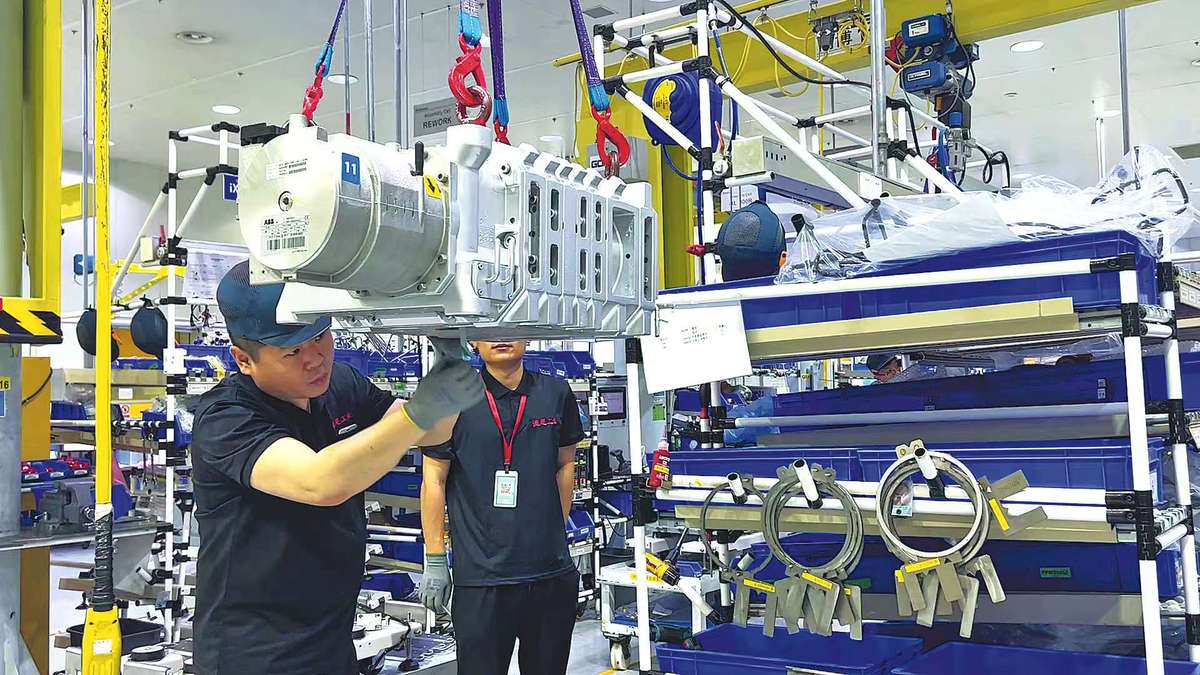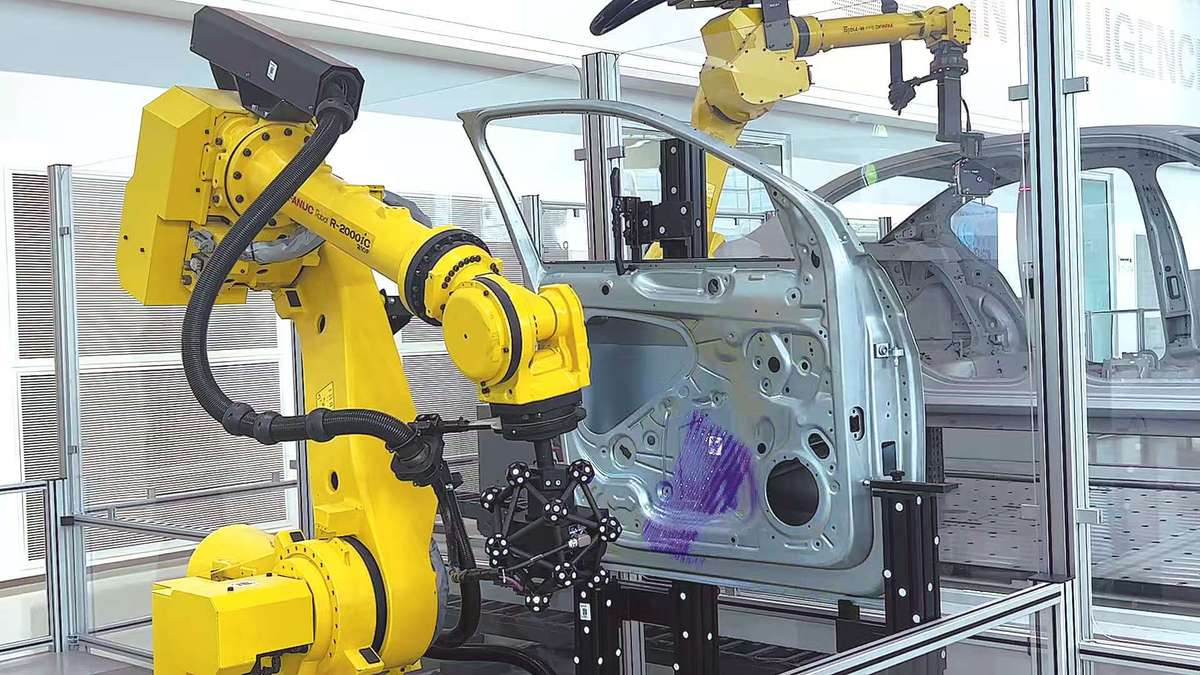Foreign firms deepen roots, strive for localization
Shandong in particular popular among major intl pharmaceutical companies


Foreign corporations are leveraging the industrial ecosystem, policy support and growing market potential of China to drive innovation and sustainable growth in the country.
From pharmaceuticals to advanced manufacturing, companies like AstraZeneca, Edwards and Hexagon are not only expanding production, but also embracing localization strategies to navigate global challenges and tap into China's high-quality development.
On May 16, workers were busy installing circuits and laying pipelines at AstraZeneca's inhalation aerosol production base in Qingdao, Shandong province, which stands as a testament to its long-term confidence in China.
The $750 million project, set to begin operations by 2028, will feature three assembly lines and one filling line, producing 54 million respiratory medicine units annually.
"This base is a pivotal step in AstraZeneca's global supply chain strategy and our commitment to Chinese patients," said Lin Xiao, general manager of AstraZeneca's China branch, while attending a ceremony marking the completion of the main structure of the first phase facility in April.
The investment is part of the United Kingdom-based biopharmaceutical firm's $1.7 billion manufacturing push in China since 2023, complementing its Wuxi and Taizhou bases in Jiangsu province. Beyond production, the company has established a regional headquarters in Qingdao, focusing on rare diseases and respiratory health, and launched a Qingdao fund under the AstraZeneca-CICC Healthcare Industrial Fund to nurture local innovation.
"The Qingdao facility, designed as a carbon-neutral plant from inception, will rely entirely on green electricity, aligning with China's dual-carbon goals," said Yuan Xuyi, general manager of the Qingdao plant of AstraZeneca.
"We chose Shandong because of its robust industrial foundation as a major economic province, complete supply chains and the government's sincere commitment to cooperation. Shandong's business environment continues to improve, with efficient government services in project approvals and policy support, enabling companies to invest with confidence," Yuan said.
Shandong, a coastal economic powerhouse, has emerged as a preferred destination for foreign corporations, hosting 19,000 foreign-funded enterprises and 943 projects by 236 Fortune 500 firms — 179 of which operate 412 projects in Qingdao alone, according to data released at the news conference held by the information office of Shandong Provincial People's Government at the construction site of AstraZeneca's Qingdao base on May 16.
"We will bolster policies, upgrade the business environment and spare no effort to help multinationals invest in Shandong confidently," said Zhang Qingwei, deputy director of the Department of Commerce of Shandong Province.
The province has been actively enhancing services for foreign businesses by organizing high-profile events such as the Qingdao Multinationals Summit, Hong Kong-Macao-Shandong Week and Singapore-Shandong Week. It has also established government-enterprise communication mechanisms, including the provincial government economic advisory council, multinationals roundtable and foreign-funded enterprises symposium.
Additionally, Shandong has improved its cross-departmental coordination mechanism for handling complaints from foreign-invested enterprises, setting up 196 complaint-handling agencies to safeguard the legitimate rights and interests of investors.
The province's policies also include subsidies for tech upgrades.
Edwards, a UK-based vacuum technology firm, has seen 30-fold growth since entering Qingdao in 2012. During its decade in Qingdao, Edwards has undergone three expansions, with the fourth phase commencing in late 2022.
"Shandong's talent pool, supply chains and business environment have significantly facilitated our growth," said Zeng Yong, general manager of Edwards' Qingdao company.
Zeng credited local authorities for "turning challenges into opportunities through responsive governance". For example, the company has received about 6 million yuan ($835,000) yearly in government subsidies for tech upgrades and phasing out obsolete capacity over the past three years.
"We'll continue increasing investments — not just relocating production but also expanding research and development capabilities here," said Zeng.
Similarly, Hexagon, a Sweden-based digital reality solutions provider, invested over 50 million yuan to add two precision instrument lines in Qingdao last year.

"From site selection to research and development, local authorities have provided unwavering support," said Zhan Yanan, vice-president of the business operations group of Hexagon Manufacturing Intelligence (Qingdao).
Amid geopolitical shifts, MNCs are adopting local strategies to mitigate risks.
"Some of our production chains of semiconductors have been influenced by international trade conflicts. We are now adopting local-for-local strategies to circumvent trade barriers," said Zeng of Edwards.
"By adopting local sources, local research and development and local production, we can prevent negative impacts from factors such as tariffs and trade conflicts," he said.
Hexagon has also localized R&D facilities and intellectual properties for core software and hardware, ensuring supply chain security.
"Shandong has consistently advanced industrial restructuring and accelerated the shift from old to new growth drivers, while increasing investment in emerging industries and high-tech sectors," said Zhang of the provincial commerce department.
Concurrently, multinational corporations have transitioned from market "entry" to full "integration", leveraging localized innovation initiatives to embed themselves deeply into Shandong's development, he said.
"Shandong and MNCs are writing a success story of growing together," said Zhang.
MNCs leverage the province to deeply integrate with China's robust domestic market while actively accessing international markets. Meanwhile, MNCs are not just investors — they also help upgrade the industrial structure in Shandong.
AstraZeneca's arrival filled the gap in transnational pharmaceutical manufacturing, while firms like Henkel, Hyundai, and HP have spurred clusters in new materials, autos and IT.
The 6th Qingdao Multinationals Summit scheduled to be held in June will focus on global industrial transformation trends, new investment patterns of multinational corporations, and Shandong's competitive edges in industrial investment promotion.
"The summit will feature events centering on AI, low-altitude economy, and silver economy, further integrating global players into China's innovation landscape," said Cai Peian, deputy director of the secretariat of the Qingdao Multinationals Summit, which serves as a permanent institution of the QMS.
Since its inception in 2019, the QMS has become China's first high-level platform exclusively tailored for MNCs. The first five editions attracted 421 Fortune 500 companies and 967 industry leaders, culminating in 592 signed projects with a total investment of $69.8 billion. And over 95 percent of these signed projects have reached operational phase.
The QMS secretariat has upgraded its services of QMS from a "three-day event" to year-round support through its full-cycle service model covering organizing matchmaking before the event, negotiations during the summit and follow-ups after the event.
"For example, for projects signed during the QMS, we provide follow-up support to facilitate implementation and assistance in resolving operational challenges," said Cai.
In 2024 alone, the secretariat facilitated the launch of over 200 projects. It also organized more than 20 events of MNCs touring Shandong last year, facilitating on-site inspections of industrial parks, matchmaking sessions with local enterprises and government roundtables.
"In the lead-up to this year's QMS, we have collected over 3,300 investment project leads from across China and delivered them to multinational corporations," said Cai.
As China accelerates new quality productive forces, the country remains not just a market, but a strategic partner for the future, said Zhan of Hexagon.
zhaoruixue@chinadaily.com.cn
























